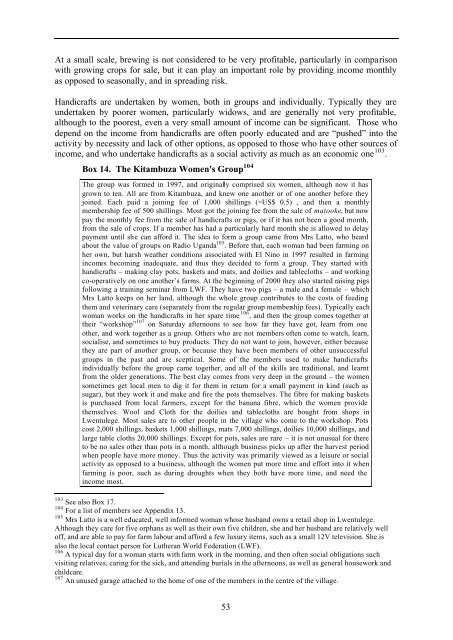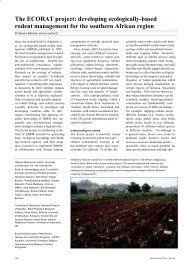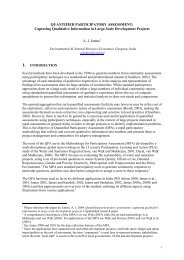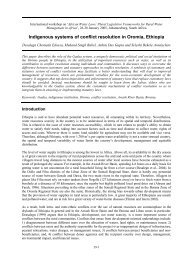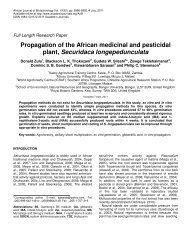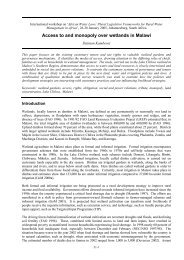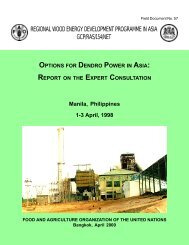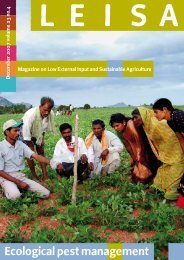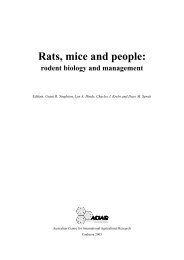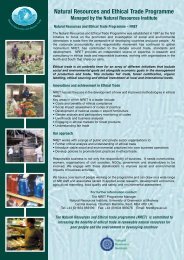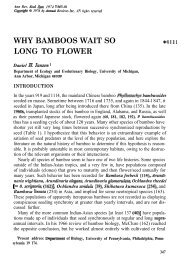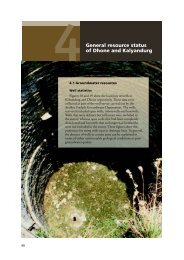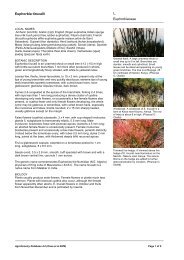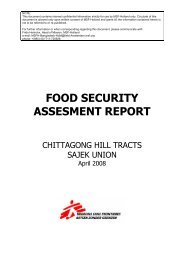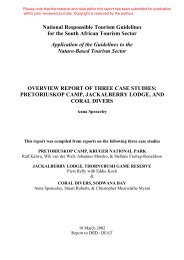Access to Rural Non-Farm Livelihoods - Natural Resources Institute
Access to Rural Non-Farm Livelihoods - Natural Resources Institute
Access to Rural Non-Farm Livelihoods - Natural Resources Institute
You also want an ePaper? Increase the reach of your titles
YUMPU automatically turns print PDFs into web optimized ePapers that Google loves.
At a small scale, brewing is not considered <strong>to</strong> be very profitable, particularly in comparison<br />
with growing crops for sale, but it can play an important role by providing income monthly<br />
as opposed <strong>to</strong> seasonally, and in spreading risk.<br />
Handicrafts are undertaken by women, both in groups and individually. Typically they are<br />
undertaken by poorer women, particularly widows, and are generally not very profitable,<br />
although <strong>to</strong> the poorest, even a very small amount of income can be significant. Those who<br />
depend on the income from handicrafts are often poorly educated and are “pushed” in<strong>to</strong> the<br />
activity by necessity and lack of other options, as opposed <strong>to</strong> those who have other sources of<br />
income, and who undertake handicrafts as a social activity as much as an economic one 103 .<br />
Box 14. The Kitambuza Women's Group 104<br />
The group was formed in 1997, and originally comprised six women, although now it has<br />
grown <strong>to</strong> ten. All are from Kitambuza, and knew one another or of one another before they<br />
joined. Each paid a joining fee of 1,000 shillings (~US$ 0.5) , and then a monthly<br />
membership fee of 500 shillings. Most got the joining fee from the sale of ma<strong>to</strong>oke, but now<br />
pay the monthly fee from the sale of handicrafts or pigs, or if it has not been a good month,<br />
from the sale of crops. If a member has had a particularly hard month she is allowed <strong>to</strong> delay<br />
payment until she can afford it. The idea <strong>to</strong> form a group came from Mrs Lat<strong>to</strong>, who heard<br />
about the value of groups on Radio Uganda 105 . Before that, each woman had been farming on<br />
her own, but harsh weather conditions associated with El Nino in 1997 resulted in farming<br />
incomes becoming inadequate, and thus they decided <strong>to</strong> form a group. They started with<br />
handicrafts – making clay pots, baskets and mats, and doilies and tablecloths – and working<br />
co-operatively on one another’s farms. At the beginning of 2000 they also started raising pigs<br />
following a training seminar from LWF. They have two pigs – a male and a female – which<br />
Mrs Lat<strong>to</strong> keeps on her land, although the whole group contributes <strong>to</strong> the costs of feeding<br />
them and veterinary care (separately from the regular group membership fees). Typically each<br />
woman works on the handicrafts in her spare time 106 , and then the group comes <strong>to</strong>gether at<br />
their “workshop” 107 on Saturday afternoons <strong>to</strong> see how far they have got, learn from one<br />
other, and work <strong>to</strong>gether as a group. Others who are not members often come <strong>to</strong> watch, learn,<br />
socialise, and sometimes <strong>to</strong> buy products. They do not want <strong>to</strong> join, however, either because<br />
they are part of another group, or because they have been members of other unsuccessful<br />
groups in the past and are sceptical. Some of the members used <strong>to</strong> make handicrafts<br />
individually before the group came <strong>to</strong>gether, and all of the skills are traditional, and learnt<br />
from the older generations. The best clay comes from very deep in the ground – the women<br />
sometimes get local men <strong>to</strong> dig it for them in return for a small payment in kind (such as<br />
sugar), but they work it and make and fire the pots themselves. The fibre for making baskets<br />
is purchased from local farmers, except for the banana fibre, which the women provide<br />
themselves. Wool and Cloth for the doilies and tablecloths are bought from shops in<br />
Lwentulege. Most sales are <strong>to</strong> other people in the village who come <strong>to</strong> the workshop. Pots<br />
cost 2,000 shillings, baskets 1,000 shillings, mats 7,000 shillings, doilies 10,000 shillings, and<br />
large table cloths 20,000 shillings. Except for pots, sales are rare – it is not unusual for there<br />
<strong>to</strong> be no sales other than pots in a month, although business picks up after the harvest period<br />
when people have more money. Thus the activity was primarily viewed as a leisure or social<br />
activity as opposed <strong>to</strong> a business, although the women put more time and effort in<strong>to</strong> it when<br />
farming is poor, such as during droughts when they both have more time, and need the<br />
income most.<br />
103 See also Box 17.<br />
104 For a list of members see Appendix 13.<br />
105 Mrs Lat<strong>to</strong> is a well educated, well informed woman whose husband owns a retail shop in Lwentulege.<br />
Although they care for five orphans as well as their own five children, she and her husband are relatively well<br />
off, and are able <strong>to</strong> pay for farm labour and afford a few luxury items, such as a small 12V television. She is<br />
also the local contact person for Lutheran World Federation (LWF).<br />
106 A typical day for a woman starts with farm work in the morning, and then often social obligations such<br />
visiting relatives, caring for the sick, and attending burials in the afternoons, as well as general housework and<br />
childcare.<br />
107 An unused garage attached <strong>to</strong> the home of one of the members in the centre of the village.<br />
53


